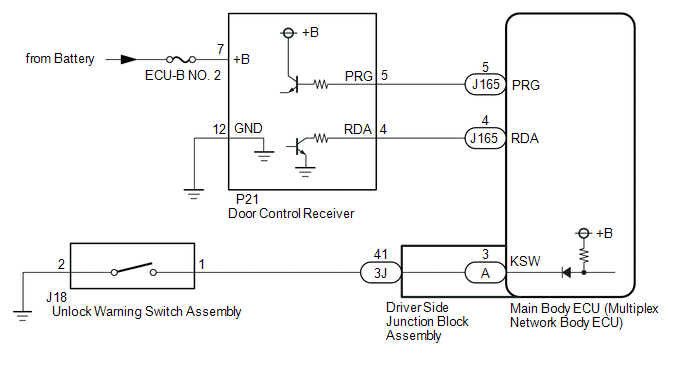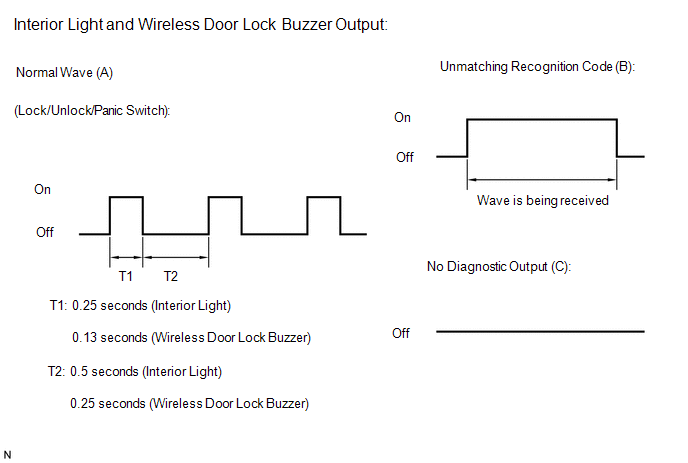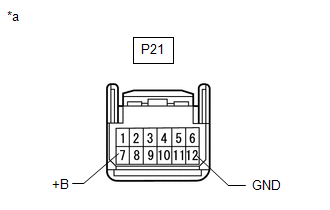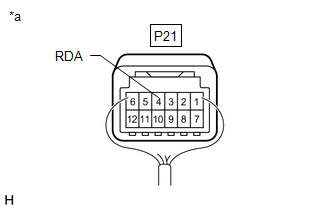DESCRIPTION
The door control receiver receives signals from the door control transmitter
assembly and sends these signals to the main body ECU (multiplex network body ECU).
The main body ECU (multiplex network body ECU) then controls all doors by sending
lock/unlock signals to each door, and sends hazard flasher signals to the combination
meter assembly.
WIRING DIAGRAM

CAUTION / NOTICE / HINT
NOTICE:
- Inspect the fuses for circuits related to this system before performing
the following procedure.
- When replacing or inspecting the door control receiver and wire harness,
do not change the position or length of the wire harness. If the wire harness
is too close to the door control receiver, wireless function performance may
be affected.
- When replacing the door control receiver, read the transmitter IDs (tire
pressure warning system) stored in the old ECU using the Techstream and write
them down before removal.
- It is necessary to perform initialization after registration of the transmitter
IDs into the door control receiver if the door control receiver has been replaced.
for Initialization:
Click here 
for Registration:
Click here 
PROCEDURE
|
1.
|
CHECK POWER DOOR LOCK OPERATION
|
(a) Check the power door lock operation.
Click here 
| Locked doors do not unlock |
 |
GO TO POWER DOOR LOCK CONTROL SYSTEM
|
| Locked doors unlock |

|
|
|
2.
|
CHECK KEY REMINDER WARNING SYSTEM
|
(a) Check that the key reminder warning buzzer operates properly.
Click here 
| Key reminder warning buzzer does not operates properly |
 |
GO TO KEY REMINDER WARNING SYSTEM
|
| Key reminder warning buzzer operates properly
|

|
|
|
3.
|
CHECK DOOR CONTROL TRANSMITTER ASSEMBLY
|
(a) When a known good registered door control transmitter assembly is used, check
that the wireless functions operate properly.
Click here 
|
Result
|
Proceed to
|
|
Wireless door lock/unlock function operates properly with a known good
door control transmitter assembly.
|
A
|
|
Wireless door lock/unlock function does not operate.
|
B
|
| B |
 |
GO TO STEP 5
|
| A |

|
|
|
4.
|
CHECK TRANSMITTER BATTERY (VOLTAGE)
|
(a) Remove the transmitter battery.
Click here 
(b) Inspect the transmitter battery capacity.
Click here 
| OK |
 |
REPLACE DOOR CONTROL TRANSMITTER ASSEMBLY
|
| NG |
 |
REPLACE TRANSMITTER BATTERY
|
|
5.
|
CHECK WAVE ENVIRONMENT
|
(a) Bring the door control transmitter assembly near the door control receiver,
and perform a wireless operation check.
HINT:
- When the door control transmitter assembly is brought near the door control
receiver, the possibility of wave interference decreases, and it can be determined
if wave interference is causing the problem symptom.
- If the inspection result is that the problem only occurs in certain locations
or times of day, the possibility of wave interference is high. Also, added vehicle
components may cause wave interference. If installed, remove them and perform
the operation check.
| Wireless functions operate properly |
 |
END (AFFECTED BY WAVE INTERFERENCE)
|
| Wireless functions do not operate properly
|

|
|
|
6.
|
SWITCH TO SELF-DIAGNOSTIC MODE
|
(a) Connect the Techstream to the DLC3.
(b) Turn the Ignition switch to ON.
(c) Turn the Techstream on.
(d) Enter the following menus: Body Electrical / Main Body / Utility / Wireless
Diagnosis Mode.
(e) Proceed to the next step in accordance with the prompts on the Techstream
screen.
|
(f) Check that the system has switched to self-diagnostic mode by checking
the interior light output pattern.
|
|
|
(g) Check that the system has switched to self-diagnostic mode by checking
the wireless door lock buzzer output pattern.
|
|
| NEXT |

|
|
|
7.
|
CHECK SELF DIAGNOSTIC MODE
|
(a) Inspect the diagnostic outputs when the door control transmitter assembly
switch is pressed. The diagnostic outputs can be checked by the flash patterns of
the interior light and wireless door lock buzzer patterns.

|
Result
|
Proceed to
|
|
Normal wave (light flash pattern) is output (A).
|
A
|
|
Unmatching recognition code is output (B).
|
B
|
|
No diagnostic outputs (C).
|
C
|
| A |
 |
REPLACE MAIN BODY ECU (MULTIPLEX NETWORK BODY ECU)
|
| C |
 |
GO TO STEP 9
|
| B |

|
|
|
8.
|
CHECK REGISTER RECOGNITION CODE
|
(a) Check that the system can be switched to rewrite mode or add mode, and that
a recognition code can be registered.
Click here 
| Recognition code can be registered |
 |
END (GO TO OPERATION CHECK)
|
| Recognition code cannot be registered |
 |
GO TO STEP 13
|
|
9.
|
CHECK DOOR CONTROL RECEIVER (RESPONSE)
|
(a) Prepare the door control transmitter assembly from another vehicle.
(b) Press and hold down the door control transmitter assembly switch.
(c) Check that an unmatching recognition code is output.
| Unmatching recognition code is output |
 |
REPLACE DOOR CONTROL TRANSMITTER ASSEMBLY
|
| Unmatching recognition code is not output
|

|
|
|
10.
|
CHECK HARNESS AND CONNECTOR (DOOR CONTROL RECEIVER - BATTERY AND BODY
GROUND)
|
|
(a) Disconnect the door control receiver connector.
|

|
|
*a
|
Front view of wire harness connector
(to Door control Receiver)
|
|
|
(b) Measure the resistance according to the value(s) in the table below.
Standard Resistance:
|
Tester Connection
|
Condition
|
Specified Condition
|
|
P21-12 (GND) - Body ground
|
Always
|
Below 1 Ω
|
(c) Measure the voltage according to the value(s) in the table below.
Standard Voltage:
|
Tester Connection
|
Condition
|
Specified Condition
|
|
P21-7 (+B) - Body ground
|
Always
|
11 to 14 V
|
| NG |
 |
REPAIR OR REPLACE HARNESS OR CONNECTOR
|
| OK |

|
|
|
11.
|
CHECK DOOR CONTROL RECEIVER (OUTPUT)
|
|
(a) Measure the voltage according to the value(s) in the table below.
Standard Voltage:
|
Tester Connection
|
Condition
|
Specified Condition
|
|
P21-4 (RDA) - Body ground
|
Ignition switch off, all doors closed and door control transmitter
assembly switch not pressed
|
11 to 14 V
|
|
Ignition switch off, all doors closed and door control transmitter
assembly switch pressed
|
Pulse generation
|
|

|
|
*a
|
Component with harness connected
(Door Control Receiver)
|
|
|
| NG |
 |
REPLACE DOOR CONTROL RECEIVER
|
| OK |

|
|
|
12.
|
CHECK HARNESS AND CONNECTOR (MAIN BODY ECU [MULTIPLEX NETWORK BODY ECU]
- DOOR CONTROL RECEIVER)
|
(a) Disconnect the J165 main body ECU (multiplex network body ECU) connector.
(b) Disconnect the P21 door control receiver connector.
(c) Measure the resistance according to the value(s) in the table below.
Standard Resistance:
|
Tester Connection
|
Condition
|
Specified Condition
|
|
P21-4 (RDA) - J165-4 (RDA)
|
Always
|
Below 1 Ω
|
|
P21-5 (PRG) - J165-5 (PRG)
|
Always
|
Below 1 Ω
|
|
P21-4 (RDA) or J165-4 (RDA) - Other terminals and body ground
|
Always
|
10 kΩ or higher
|
|
P21-5 (PRG) or J165-5 (PRG) - Other terminals and body ground
|
Always
|
10 kΩ or higher
|
| NG |
 |
REPAIR OR REPLACE HARNESS OR CONNECTOR
|
| OK |

|
|
|
13.
|
REPLACE DOOR CONTROL RECEIVER
|
(a) Temporarily replace the door control receiver with a new or known good one.
- for Double Cab:
Click here 
- for CrewMax:
Click here 
| NEXT |

|
|
|
14.
|
CHECK REGISTER RECOGNITION CODE
|
(a) Perform the Registration procedure.
Click here 
| NEXT |

|
|
|
15.
|
CHECK DOOR CONTROL RECEIVER (OPERATION)
|
(a) Check that the doors can be locked and unlocked by the door control transmitter
assembly lock and unlock switches.
OK:
Doors can be locked and unlocked by the door control transmitter assembly.
| OK |
 |
END (DOOR CONTROL RECEIVER WAS DEFECTIVE)
|
| NG |
 |
REPLACE MAIN BODY ECU (MULTIPLEX NETWORK BODY ECU)
|
| 
